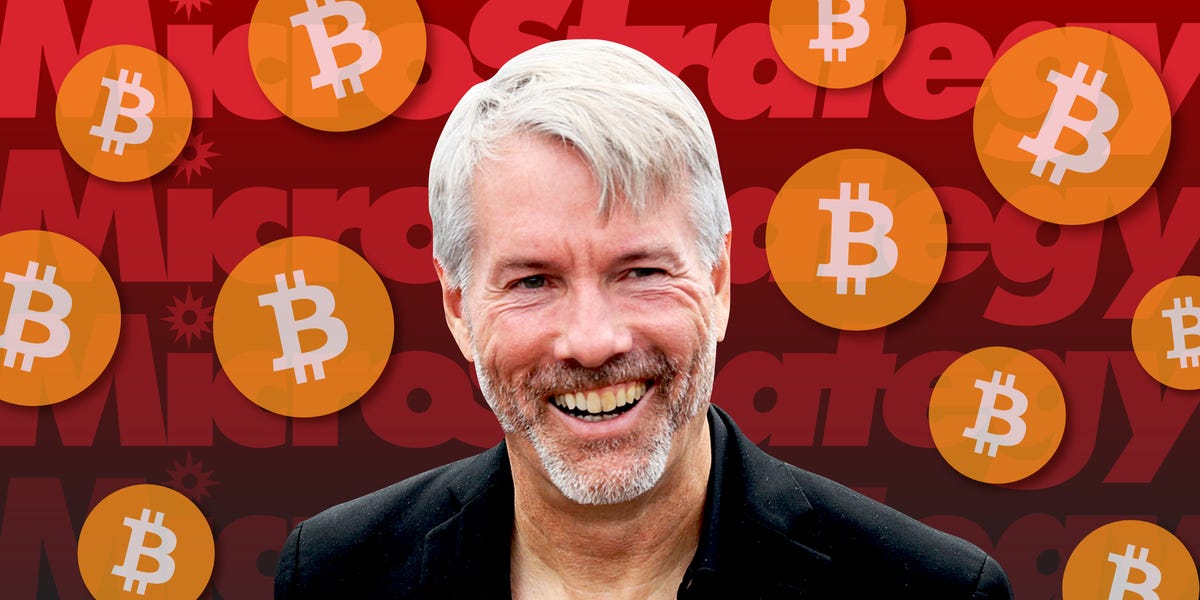Astronomical Bitcoin Price Prediction From Michael Saylor
27.07.2024 8:00 1 min. read Alexander Stefanov
During a keynote speech at the Bitcoin 2024 conference on July 26, Michael Saylor, co-founder of MicroStrategy, made a bold prediction that Bitcoin (BTC) could reach $13 million per coin by 2045.
This updated forecast surpasses his previous estimate of $10 million made in June.
Saylor outlined various scenarios, suggesting that Bitcoin could range from $3 million in a bear market to $49 million in an extremely bullish market. He encouraged attendees at the Nashville, Tennessee event to adopt a highly bullish stance on Bitcoin.
Saylor advised individuals to go all-in on Bitcoin by financing their homes with Bitcoin, converting all assets to Bitcoin, and moving to low-tax jurisdictions to maximize investment. He claimed this strategy could potentially lead to a net worth of $214 million and recommended similar approaches for corporations and nation-states.
Highlighting the limitations of physical assets like stocks, bonds, luxury cars, and real estate, Saylor argued that they are all subject to entropy, which diminishes their value over time. He pointed out that even the most enduring physical assets, such as the UK Crown Estate, only last a fraction of Bitcoin’s potential lifespan.
Saylor emphasized that Bitcoin is unique because it is “immortal, immutable, and immaterial,” making it a solution to economic challenges. Unlike physical assets, Bitcoin exists beyond the physical realm and boasts an infinite lifespan.
-
1
Elon Musk Unveils His Own ‘America Party,’ Signals Pro-Bitcoin Political Shift
07.07.2025 11:40 2 min. read -
2
Bitcoin Blasts Past $121,000 as Institutions Fuel Rally—Will Altcoins Follow?
14.07.2025 8:15 2 min. read -
3
Bitcoin: What to Expect After Hitting a New All-time High
10.07.2025 14:00 2 min. read -
4
Peter Brandt Issues Cautious Bitcoin Warning Despite Bullish Positioning
10.07.2025 20:00 2 min. read -
5
Vanguard Now Owns 8% of Michael Saylor’s Strategy, Despite Calling BTC ‘Worthless’
15.07.2025 17:09 2 min. read
Global Money Flow Rising: Bitcoin Price Mirrors Every Move
Bitcoin is once again mirroring global liquidity trends—and that could have major implications in the days ahead.
What is The Market Mood Right Now? A Look at Crypto Sentiment And Signals
The crypto market is showing signs of cautious optimism. While prices remain elevated, sentiment indicators and trading activity suggest investors are stepping back to reassess risks rather than diving in further.
What Price Bitcoin Could Reach If ETF Demand Grows, According to Citi
Citigroup analysts say the key to Bitcoin’s future isn’t mining cycles or halving math—it’s ETF inflows.
Is Bitcoin’s Summer Slowdown a Buying Opportunity?
Bitcoin may be entering a typical summer correction phase, according to a July 25 report by crypto financial services firm Matrixport.
-
1
Elon Musk Unveils His Own ‘America Party,’ Signals Pro-Bitcoin Political Shift
07.07.2025 11:40 2 min. read -
2
Bitcoin Blasts Past $121,000 as Institutions Fuel Rally—Will Altcoins Follow?
14.07.2025 8:15 2 min. read -
3
Bitcoin: What to Expect After Hitting a New All-time High
10.07.2025 14:00 2 min. read -
4
Peter Brandt Issues Cautious Bitcoin Warning Despite Bullish Positioning
10.07.2025 20:00 2 min. read -
5
Vanguard Now Owns 8% of Michael Saylor’s Strategy, Despite Calling BTC ‘Worthless’
15.07.2025 17:09 2 min. read


